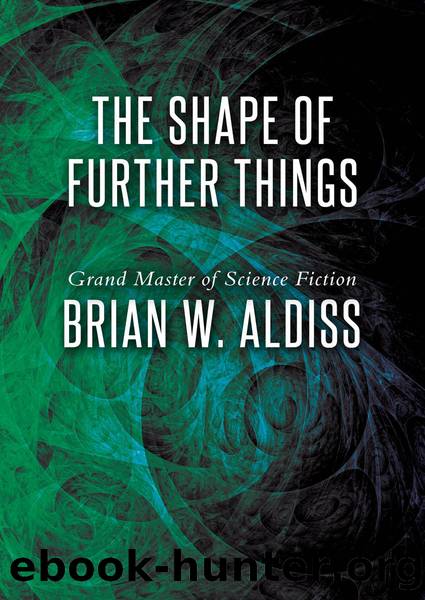The Shape of Further Things by Brian W. Aldiss

Author:Brian W. Aldiss
Language: eng
Format: epub
Publisher: Open Road Media
Published: 1969-12-31T16:00:00+00:00
Chapter Eleven
An SF Convention in the Fifties
When I first came downstairs this morning, at 8.15, it was still scarcely daylight. Mist pressed thickly up against the house. As I took the chain off the front door, I could see car headlights down on the road flitting like will-oâ-the-wisps beyond the invisible tree-trunks. I moved through the house, drawing curtains, not putting on any lights for as long as possible, trying to persuade Nickie to go out for her morning pee.
The intense love one has of oneâs home is really a love of life itself. At the time, I believed we would never be more content anywhere than we were at Jasmine. Yet we are as content, or more so, here. That pokey house at Kidlington was the only one I felt little affection for; my terraced house in Marston Street was smaller, yet I loved it. Were I put in solitary confinement for a term of years, I would grow to love every miserable stone of my cell!
Now we battle with the County Planners for the right to live here undisturbed.
In the confinement of my study, let me get back to the subject of science fiction in the fifties, when we were very young.
The name of Philip K. Dick has already been mentioned. He emerged with a great burst of activity in the early fifties, and has kept up a hefty output ever since. Perhaps because he is too facile, the actual quality of his writing is sometimes shoddy. This is a criticism often levelled at the greatest novelistsâDickens and Dostoevsky notably. But Dick is a man obsessed by a great theme; it is hard, as it should be, to outline exactly what this theme is, although it has to do with basics like the equations of evil and the obsessive quality of life and the struggle between real and false.
In his best books, Dick stays within this great glowing target area and achieves some remarkable hits.
It is in this quality of pursuing a theme that Dick is able to rise above his fellows; the heavy guns of Robert Heinlein, the intelligent little cages of Robert Sheckley, the joyous disasters of John Wyndham, cannot compare with that peculiar Dick mixture of utter madness and sheer sanity interfused in novels like Martian Timeslip, The Three Stigmata of Palmer Eldritch, Do Androids Dream Electric Sheep? and the superb Man in the High Castle.
Of other writers active in the early fifties, the first name to burst like a starshell from the SF ghetto was Ray Bradbury. His introduction into England was distinguished. Rupert Hart-Davis recognized the quality of his writing and published him in elegant hard-cover editions. The Observer published some of his short stories. It was a curious sensation to open the Sunday paper and find there Bradburyâs Golden Apples of the Sun, illustrated by Leonard Rosoman. The last time that story had appeared was in Startling Stories, behind a lurid cover which would have killed off the sensitive readers of the Observer!
In those (comparatively) early days, science fiction won some excellent supporters.
Download
This site does not store any files on its server. We only index and link to content provided by other sites. Please contact the content providers to delete copyright contents if any and email us, we'll remove relevant links or contents immediately.
Hit Refresh by Satya Nadella(9122)
When Breath Becomes Air by Paul Kalanithi(8424)
The Girl Without a Voice by Casey Watson(7883)
A Court of Wings and Ruin by Sarah J. Maas(7810)
Do No Harm Stories of Life, Death and Brain Surgery by Henry Marsh(6933)
Shoe Dog by Phil Knight(5256)
The Rules Do Not Apply by Ariel Levy(4956)
A Higher Loyalty: Truth, Lies, and Leadership by James Comey(4948)
Hunger by Roxane Gay(4921)
Tuesdays with Morrie by Mitch Albom(4767)
Everything Happens for a Reason by Kate Bowler(4729)
The Immortal Life of Henrietta Lacks by Rebecca Skloot(4571)
Millionaire: The Philanderer, Gambler, and Duelist Who Invented Modern Finance by Janet Gleeson(4463)
How to Change Your Mind by Michael Pollan(4355)
All Creatures Great and Small by James Herriot(4307)
The Money Culture by Michael Lewis(4196)
Man and His Symbols by Carl Gustav Jung(4127)
Elon Musk by Ashlee Vance(4120)
Tokyo Vice: An American Reporter on the Police Beat in Japan by Jake Adelstein(3977)
